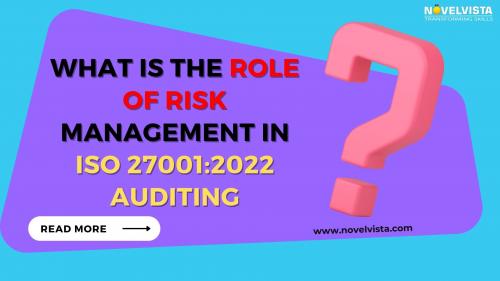What Is the Role of Risk Management in ISO 27001:2022 Auditing?

Risk management is a cornerstone of the ISO
27001 standard, especially in its latest iteration, ISO 27001:2022. For those
pursuing ISO 27001 certification or looking to upgrade their skills through an
ISO 27001 course, understanding the role of risk management in auditing is
crucial. This article delves into how risk management is integrated into the ISO
27001:2022 auditing process, highlighting the importance of
effective risk assessment and the challenges auditors face in the evolving
landscape of information security.
Integrating Risk Assessment in the ISO
27001:2022 Auditing Process
Integrating Risk Assessment in the ISO
27001:2022 Auditing Process" delves into the crucial role of risk
assessment within the framework of ISO 27001:2022, a key standard for
information security management systems (ISMS). This piece explores how risk
assessment is seamlessly woven into every stage of the ISO 27001 auditing
process, highlighting its significance in identifying, analyzing, and managing
information security risks effectively.
The article provides insights into the
methodologies and best practices employed in conducting thorough risk
assessments, a foundational step for organizations aiming to achieve ISO 27001
certification. It emphasizes how auditors, equipped with specialized training
and knowledge from ISO 27001 courses, approach risk assessment not just as a
compliance activity, but as a strategic tool to enhance the overall security
posture of an organization.
Furthermore, the piece outlines the steps
involved in integrating risk assessment into the audit cycle, from initial
planning and scoping to the final evaluation of the ISMS. It underscores the
importance of understanding the organization’s context, identifying potential
threats and vulnerabilities, and evaluating the effectiveness of existing
controls.
Tools and Methodologies for Effective Risk
Management
Those undergoing ISO 27001 training courses
will learn about various tools and methodologies for risk management. These
tools range from qualitative to quantitative approaches and include risk
matrices, software tools, and more sophisticated analytical techniques. The
choice of tool often depends on the organization's size, complexity, and
specific industry needs. The key is to use a method that provides a clear,
understandable, and actionable risk assessment.
Evaluating the Adequacy of Risk Mitigation
Measures
One of the vital skills imparted in an ISO
27001 certification for individuals is evaluating the adequacy of
risk mitigation measures. Auditors must examine not only if risk mitigation
strategies are in place but also if they are effective and proportionate to the
risks identified. This evaluation often involves reviewing policies,
procedures, control implementations, and ongoing monitoring mechanisms.
Challenges in Assessing Risks in a Constantly
Evolving Cyber Threat Landscape
It is an insightful article that addresses the
complexities and obstacles faced by organizations in identifying and mitigating
risks in the fast-paced and ever-changing realm of cybersecurity. This piece is
particularly relevant for professionals involved in the implementation and
maintenance of Information Security Management Systems (ISMS) as per the ISO
27001:2022 standards.
The article delves into the dynamic nature of
cyber threats and how their rapid evolution poses significant challenges for
risk assessment processes. It highlights the difficulty in keeping abreast of
the latest security threats, vulnerabilities, and attack vectors that can
impact an organization's digital assets and data integrity.
Key focus areas include the need for continuous
monitoring and updating of risk management strategies, the importance of
integrating new technologies and methodologies for effective risk detection,
and the challenges in predicting and preparing for emerging threats. The
article also discusses the critical role of employee awareness and training in
recognizing and responding to cybersecurity risks.
Frequency of Risk Assessments for Ongoing
Compliance
It is a comprehensive exploration of the
essential practice of conducting regular risk assessments within the framework
of ISO 27001:2022. This article highlights the critical importance of periodic
risk assessments in maintaining and enhancing an organization's Information
Security Management System (ISMS) for sustained compliance and security.
The focus of the piece is on understanding the
optimal frequency of risk assessments to ensure that an organization's risk
management process stays current and effective against the backdrop of an
ever-evolving cyber threat landscape. It discusses the factors that influence
the timing of these assessments, including changes in technology, business
processes, and external threats.
Moreover, the article provides guidance for
organizations and ISO 27001 certified professionals on how to determine an
appropriate risk assessment schedule that aligns with the specific needs and
risk profile of their organization. It emphasizes that risk assessments are not
a one-time activity but an ongoing process crucial for the proactive
identification and mitigation of potential security risks.
Conclusion
For professionals seeking ISO 27001 lead
auditor certification, understanding the pivotal role of risk management in the
ISO 27001:2022 auditing process is essential. The ability to effectively
assess, manage, and mitigate risks is what sets apart a competent auditor. It
ensures not only the security of information but also the resilience and
robustness of an organization's ISMS. As the cyber threat landscape continues
to evolve, the skills and knowledge acquired through an ISO
27001 certification remain invaluable assets for individuals and
organizations alike.
Post Your Ad Here
Comments